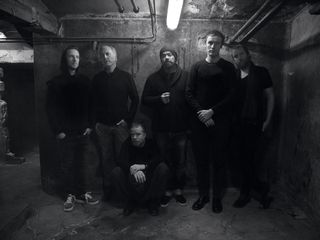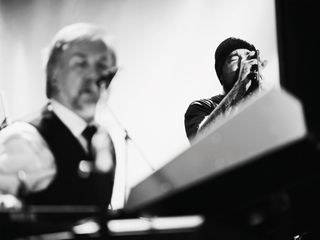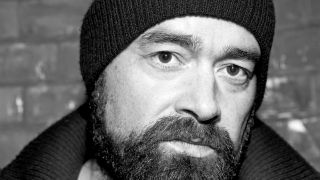Today is a very different time for music because people’s attention spans are so short,” laments Kristoffer Rygg, Ulver’s maverick frontman for 22 years. “People don’t have the time unless they are basically spoon‑fed what to listen to. The good old days of digging for music are gone and it’s a shame.”
He’s highlighting the modern relevance of his band’s captivating 12th release, ATGCLVLSSCAP – a title comprising the first letter of each of the 12 signs of the zodiac.
The Norwegian forefathers of strange continue to sail between the murky lines of darkened prog and experimental Krautrock on this entirely live album that was mostly improvised and recorded over 12 shows in February 2014. Each song builds slowly at a repetitive and hypnotic pace, combining rock and electronic soundscapes.
“It’s not strictly jazz improv because we didn’t just walk onstage with no idea of what to play – it was more of a synthesis,” Rygg explains. “There’s a lot of improvisation on this album, but it’s difficult to determine exactly how much. We had an idea of some basslines, groovy riffs and how long we should play a song before we changed the pace of it. All of the songs started off minimal from the onset and then we added enhancements, like samples, that we could layer ourselves on top of each track.”
Ulver’s most notorious live album to date is The Norwegian National Opera, recorded in their home country in 2013. The DVD features a visual transcendence of emotion, making for a cinematographic experience and a piece of progressive art that enhanced their reputation from eccentric to respected.
We like the album experience and no matter how hard we try, we cannot seem to wrap our heads around the whole ‘one song at a time’ thing.
“I used to think that people get more of an experience from music by hearing it live, and I still do to some extent,” Rygg says. “In many ways this new album is an answer to that and it’s trying to embrace live music as we like to idealise it – as fuelled by the moment.”
Gradually adopting a lighter musical atmosphere since their 2012 psychedelic covers album Childhood’s End, Ulver have found a balance between creativity and passion, prioritising the jamming element between the band’s members.
“The kind of vibes you feel from playing live were harder for us before because we were more set in sync with imagery and a more conceptual way of thinking that was linked closer to lyrical ideas,” explains Rygg, referring to the style of earlier albums such as Blood Inside and Shadows Of the Sun. “We were stuck in a more fixed catalogue, I would say. This album documents us really trying to get behind the idea of being fully live and finding our feet within it.
“Considering our recent output, like Wars Of The Roses and particularly Childhood’s End, we are more ‘Ulver the rock band’ now, as opposed to the darker music we made in the past, where we would isolate ourselves in the studio and work a lot more with electronics, synths and soundscapes to ultimately sculpt the music very differently.”
The darkness that enveloped the band since the beginning has now subsided. New song Cromagnosis in particular makes way for positive energy through powerful chords and a repetitive flow of mechanical riffs.
“There’s also the truth that after an album like Shadows Of The Sun, you couldn’t possibly get any darker,” says Rygg. “The Opera show was quite defiant and hard on the senses. It can get almost convulsive to constantly go for the existentialist darkness. This was never something we deliberately did and although it’s not conscious, but more of a natural occurrence, perhaps we are trying to free ourselves a bit from that darkness.”
Indeed, the band’s trademark emphasis on creating visuals through sound is less dark this time around, alluding more to music from a hazy 70s art film soundtrack.
When it came to putting the album together, Mancunian multi-instrumentalist Daniel O’Sullivan was a driving force. A member of Ulver since 2011, he took charge of the multitrack recordings from the tour, sculpting and editing the hours of material in a studio in North London.
“To make the album, we had to listen to about 20 hours of multitracks of gigs and decide which bits to go with,” says Rygg. “Dan did most of that main legwork for the album so when we later got involved, it was with a fresher mind and more enthusiasm than we would usually have when it comes to post-production.”

ATGCLVLSSCAP was intended to be a more instrumental affair than previous Ulver offerings. As Rygg explains, “I was too busy doing other things on stage as I was jamming with the guys! In the song Ecclesiastes (A Vernal Catnap), it made sense to pick up the mic because it was nice to sing on top of the mellow music. In fact, we usually played that one at the end of the shows, with varying degrees of success.
“I did use the mic a lot as an effect rather than actual singing, in order to create a rhythm and a build-up in some songs that people got into more than by listening to words or singing.”
There’s a split ratio of electronic sounds and classic rock instruments throughout the album, with both underlining the subtlety of echoed and repeated notes. Those notes are masterfully blended to convey an extra‑planetary calm.
I think we hide the humour in our albums a little too well. I do feel that some people take us a little bit too seriously sometimes.
“I love the organic touch of instruments and I also love when electronics are actually being played, instead of music that’s preprogrammed,” Rygg reveals. “Otherwise you’re just filtering the music but you aren’t playing it. However, sounds that have been meticulously programmed can definitely have a soul, but there isn’t as much that can be felt in the moment as when you play live with other guys.”
When discussing his influences, Rygg mentions Magma, King Crimson and Swedish psychedelic band Goat, and the strongest influence detected in this new album is early-70s German psychedelia. Although there’s a slight reticence from Rygg to put a label on his musical creation, he says, “I would say that a lot of the music we have done is prog. An album like Blood Inside is definitely prog and in my opinion probably our most prog album, although some people might disagree.
“We’ve been listening to all of the types and sub-types of progressive music for the last 20 years but we haven’t consciously been trying to be a part of the prog world and we don’t define ourselves by those parameters. In fact, we had some good times with Kscope, who are a pretty prog label, where we shared the roster with some bands that are more explicitly prog than we are. Perhaps that’s when we became the strange birds in the prog roster!”

It would be fair to say that Ulver have mastered the concept album. From 1998’s Themes From William Blake’s The Marriage Of Heaven And Hell to 2013’s Messe I.X-VI.X, featuring the Tromsø Chamber Orchestra, the Norwegian convention-breakers find comfort in musical storytelling.
“To us we are just old school and we love our prog rock,” says Rygg. “We like the album experience and no matter how hard we try, we cannot seem to wrap our heads around the whole ‘one song at a time’ thing. We feel that music needs to be bigger than that in this wolf’s universe. We haven’t created any concepts but it’s fair to say that most of our albums are either musically conceptual or thematically conceptual to some extent.”
After the release of debut album Bergtatt – Et Eeventyr i 5 Capitler in 1995, Ulver developed a cult following, gaining fans in the Scandinavian extreme metal scene. Their blend of distorted guitar riffs, acoustic melodies and folk vocals set the tone for a new and improved genre. However, the band’s separation from extreme music after three albums caused discontent among some of their original fans.
“Those first two albums had quite an impact in those days and in that scene, but it was a different time for me – I changed and the music changed. People often come to me to ask why I don’t do a couple of shows only playing the first album. I’m dumbfounded by that because we just can’t – it’s not that band any more. Conversely, lots of people prefer our new music to the old so it means there’s a good mix of contrasting opinions out there, which I believe is good and healthy.”
The new album’s title is a prime example of Ulver’s utterly deadpan Scandinavian humour and wit, which is sometimes hidden behind the taciturnity of the music and the gloomy imagery.
“We came across the mnemonic All The Great Constellations Live Very Long Since Stars Can’t Alter Physics. To be honest, we thought it would be pretty funny to name our album something you cannot actually pronounce!
“I think we hide the humour in our albums a little too well,” Rygg admits. “I do feel that some people take us a little bit too seriously sometimes. They see us as these dark characters but we’re not that at all. This album is born from having a good time, playing live music and tripping out together as a band.”
ATGCLVLSSCAP is out now on Jester Records.



